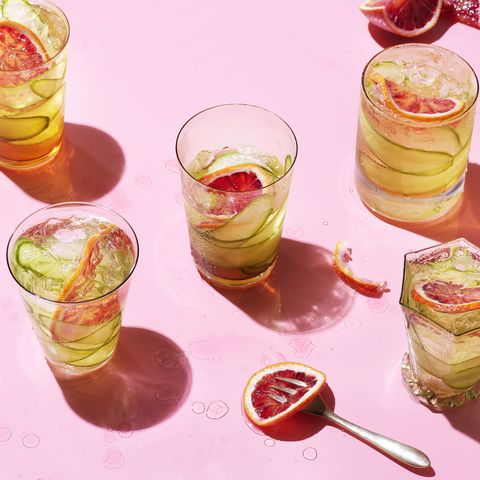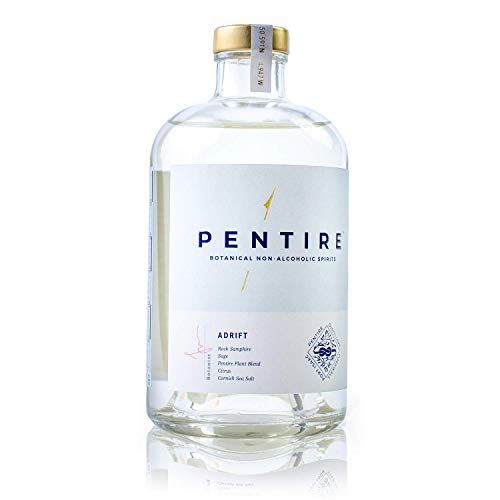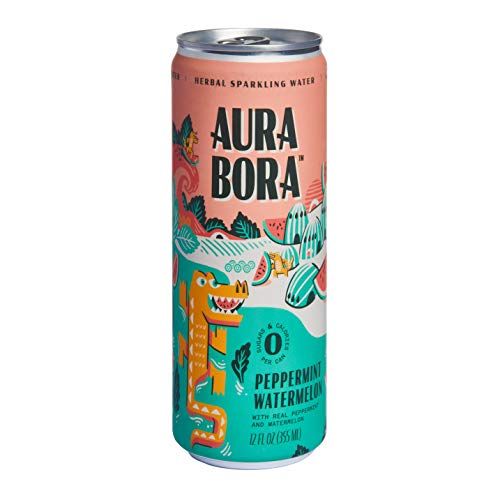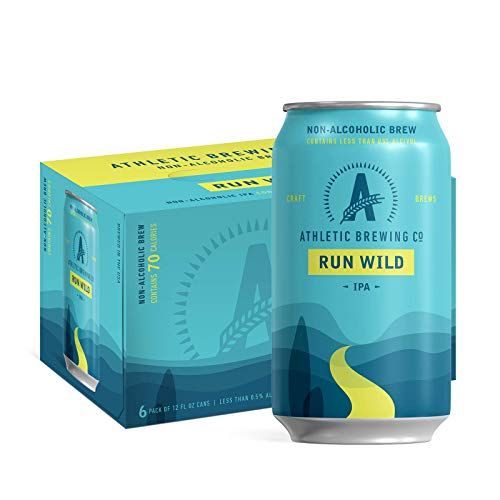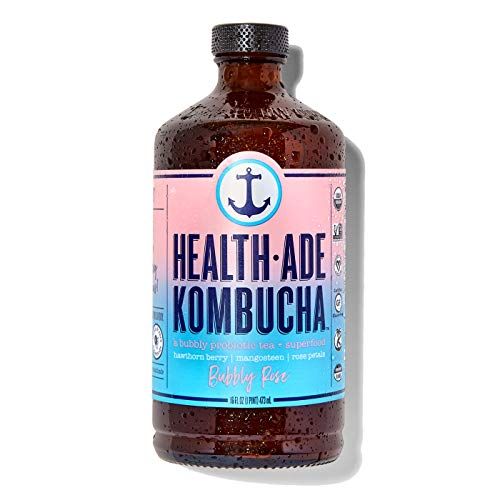There are a bunch of good reasons why you might be drawn to the idea of Dry January, a time when people make the decision to stay away from booze for a month. Maybe you’re simply ready for a break after a season of spiked eggnog and celebratory bubbly. Or maybe your concerns are more serious — perhaps you’ve awakened with that “Oh no, why did I overdo it last night?” headache one too many times recently, or you’ve been looking forward a little too much to your traditional end-off-the-workday cocktails.
The truth is, alcohol has become more of a problem in our society since the COVID-19 pandemic: According to research from Massachusetts General Hospital, drinking to excess (including binge drinking) increased by 21% in the U.S. during the pandemic. And the researchers project that just a one-year increase in alcohol consumption will lead to an estimated 8000 deaths from alcohol-related liver disease.
Scary statistics — though it’s not terribly surprising that people turned to alcohol when dealing with all the uncertainty that the pandemic brought to our lives. “Alcohol hits the neurochemical pathways in our brain and releases endorphins that make us feel good,” says Michael Levy, Ph.D., a psychologist based in Florida and the author of Take Control of Your Drinking. Sitting down with a cold beer or a glass of wine can temporarily provide a sense of ease and comfort, so it’s no wonder so many people gravitate to a drink to unwind.
Why do people do Dry January?
January, of course, is the time of year when our culture has programmed us to think about breaking habits that no longer support us and trying out a healthier path, so if someone is concerned about their use of alcohol, it can be a perfect time to jump aboard. “Dry January appeals to someone who may have noticed a pattern that they’re drinking a little bit more than they should, especially during the holidays,” explains Levy. People may be surprised to know what science considers a moderate consumption of alcohol: For women, it is about one glass per day and no more than seven per week. Drinking more than that can lead to a slew of health issues, so a month-long break could be the kickstart you’re looking for in the new year.
When February hits, you might find that your view of alcohol’s place in your life has shifted, and you could even reap some significant health benefits. “You may feel so good that you think, what was I drinking for to begin with?” says Amy Knoblock-Hahn, Ph.D., R.D., a registered dietitian and health behavior expert in St. Louis.
How Dry January can benefit your health:
You’ll get a mood boost.
When you sip a glass of wine or down a tasty cocktail, it might seem to perk you up and make the day’s worries slip out of sight. Over time though, if drinking alcohol becomes one of your main coping strategies, it may hide underlying depression or anxiety, says Ashley Jones, APRN-CNP, a certified family nurse practitioner at The Ohio State University Wexner Medical Center. “Alcohol tends to make these symptoms worse, so you may find that your mood is actually more stable when not consuming alcohol,” she says.
Even when you don’t drink to excess, you may find that you have a feeling of anxiety the morning after you’ve had a drink or two, and there’s a name for that feeling: “hang-xiety.” This emotional slump could be brought on by a dip in one’s blood sugar (especially if you’ve been downing sugary cocktails) or a rise and then fall in a brain chemical called GABA.
While it won’t cure an illness like depression to participate in Dry January, stepping back from your nightly vino could help you consider what your motivation is for drinking. Sometimes, people use alcohol to self-medicate when they’re experiencing a mental health issue, and when you take a break from doing that you’ll be in a better position to recognize if you could benefit from a talk with your doctor, undergoing therapy or taking advantage of other natural and science-backed mood lifters like exercise or spending time in nature.
You’ll sleep more soundly.
You may notice that after an evening of wine or cocktails with your friends, you fall asleep in a flash — only to wake up just a few hours later. Research suggests that may happen because alcohol interferes with our body’s handling of adenosine, a chemical in our body that makes blood vessels relax and dilate. And even if you’re someone for whom alcohol doesn’t cause these middle-of-the-night awakenings, you may well rise groggy in the morning. That’s because drinking moderate or high amounts of alcohol decreases “restorative” REM sleep, according to a review in the journal Alcoholism Clinical & Experimental Research. A new small study in the same journal found that drinking alcohol caused negative effects, such as a decrease in sleep time and sleep efficiency. Giving up drinking for a month may improve your sleep and give you more energy for other activities.
You might feel less bloated or even drop a few pounds.
Depending on how much you were drinking before (as well as your starting weight), it’s possible you could lose shed a few pounds over the course of the month, says Knoblock-Hahn. Not only do boozy beverages add calories, those calories are liquid calories, which research shows don’t fill you up the way food calories do. “Many times, when people stop or cut back on drinking, they don’t replace those calories. You may find that just this one change helps you lose weight,” she says. Another reason why you could see a change: People often eat more junky food when they’ve been drinking, and your eating habits could automatically change somewhat when you cut out alcohol.
Getting bloated from alcohol tends to happen in those who drink more than the recommended amount: Research in the journal Alcohol Research shows that chronic alcohol use can bring on inflammation in the GI tract, bringing on all sorts of problems in the body. Taking a break can give your body a rest — and maybe make you look at your habits differently.
Editor’s Note: Weight loss, health and body image are complex subjects — before deciding to go on a diet, we invite you gain a broader perspective by reading our exploration into the hazards of diet culture.
You’ll save money.
If you’ve been regularly shelling out $10 to $15 for a fancy cocktail or pour of wine, that adds up fast. Even a regular habit of beers after work can put a dent in your budget. And in case you’re worried that your friends will push you to drink, or that you’ll feel awkward about it in social situations, consider telling your pals that you’re taking a month off and that you’d appreciate their support. Don’t feel like sharing? Just hold a glass of bubbly water with lime, and chances are no one will think too much about it. And the server will be happy as long as you tip well when it’s time to settle up!
Your skin might look brighter.
Alcohol is a known diuretic, which means it causes you to pee more than if you just drink water. As a result, it’s harder for the body to hydrate itself, and being dehydrated can lead to dry, lusterless skin. Alcohol also has the potential to increase hormones like estrogen and cortisol, as well as spike your blood sugar if you tend to reach for sugary cocktails — a recipe for breakouts. On top of all that, research in the Journal of Clinical and Aesthetic Dermatology has shown that the toxins in alcohol can speed up your skin’s aging process.
You’ll have a stronger immune system.
Binge drinking (more than four drinks in a single occasion for women) may suppress your body’s immune response. A 2015 study in the journal Alcohol found that when healthy folks (those who normally consume low or moderate levels of alcohol) had an episode of binge drinking, their immunity initially rose. However, two to five hours later, levels of disease-fighting immune cells decreased. Researchers don’t know if this means you’re more likely to be saddled with a sickness — but it’s certainly not a good thing if your immune system is slacking off, even temporarily.
You’ll feel better in the morning.
Even if you don’t wake up with a full-blown hangover after drinking, you likely aren’t waking up at your best. First of all, there’s that “hang-xiety” effect, described above. Plus, all of that poor sleep and dehydration can really put a damper on how energetic you’ll feel. When you’re thinking about having an alcoholic beverage, Levy says it’s a good idea to take a step back and think about your morning. “People, if they’re trying not to drink and they don’t, the next morning they’re going to say, ‘Oh, I’m glad I did not drink. It feels great,” says Levy. “If they do drink, I guarantee they are not going to say that.”
You’ll have a new relationship with alcohol.
A pause on alcohol may help you realize that you don’t have to drink every day or even drink at all. “You may learn that you don’t need it in your life,” says Levy. If you do choose to drink again come February, the month off will also lower your tolerance, so you’ll be able to get a buzz on with fewer drinks. (But it’s better if you don’t use that as an excuse to drink more!)
How to have a successful Dry January:
Begin journaling.
At the beginning of the month, Levy suggests thinking about why you want to take a break from drinking and write it down. Is it to sleep better? Is it to feel less bloated? Is it to set a better example for your kids? Then, if sometime during the month you’re facing a particularly strong urge to drink, you can look back at what you wrote and remind yourself of your end goal. When you look back at the end of the month, Sheinbaum says this journal can also illustrate the ways that ditching alcohol could make life better for you. “Document how your skin looks, your mood and energy, the hours of sleep you’re getting, and more,” she advises.
Break up your routine.
When you’re trying to change a habit, it’s a good idea to switch up your routines. Here’s why: If you’re used to going home and pouring a glass of red, you may feel a bit lost when you go dry. “Drinking gets set off by the triggers in the environment,” says Levy. For many people, that trigger might be taking off your shoes and settling in at the end of a long day. But if you delay your return home by say, taking a fitness class, running errands or seeing a movie with a friend, your whole routine is thrown off, and that can knock off your desire to drink. You don’t need to be gone all night — the idea is to get home at least after the “bewitching hour,” says Levy, which for many people is 7 p.m. Plus, you’ll find that your evenings seem longer, and you’ll feel sharper and less foggy-brained before you head to bed.
Recruit a friend.
It’s how now-pro Hilary Sheinbaum initially accomplished Dry January. She’s tacked that advice at the top of her month-long guide to going sober, The Dry Challenge. When you line up a friend, “this person (or group) will be there to keep you company as you look to partake in non-drinking activities, as you face similar feelings and potential obstacles, and if you need someone vent to,” Sheinbaum tells Good Housekeeping. “On that note: they keep you accountable, too —you can even make a bet, like I did.”
Start a new workout regimen.
Since drinking alcohol too often can leave you feeling tired and dehydrated, Dry January might be the best time to develop a new fitness habit. Without the booze, you could have a surge of energy. And when you’re working out several times a week, you might not want to reach for the bottle as often so you feel fresh at the gym.
Look for a substitute.
If drinking is a habit, you’ve got to find a replacement sip. Water is the best choice, says Knoblock-Hahn — however, a tall ice water won’t do it for everyone. In that case, it’s smart to look for ways to make the water taste good and feel special. Try infusing it with sliced citrus fruits, berries or cucumber and mint. Or pour a can of naturally flavored sparkling into a wine glass. Ready-to-drink mocktails can also get you through the month without making you feel like you’re missing out.
Rethink happy hour.
If you and your friends regularly get together at a bar for happy hour, that might be something that’s tough for you: For some, being around alcohol is going to present too many temptations. For others, though, it’s no big deal. “If it’s particularly challenging, you may be better off taking a break from activities like happy hour or boozy dinners with friends for the month,” says Levy. Think of it as a good opportunity to suggest other ways to gather together and have fun!
Explore new ways to cope.
If the glass of vino is one way you use to de-stress after the day, you need an alternate way to simmer down. When times get frazzled and you’re looking to have a drink or stress-eat, Knoblock-Hahn recommends the “distract and delay” tactic. Leave the kitchen and go to another room to read a book or magazine. Take a walk with your ear buds and a good podcast, or do a few light stretches or breathing exercises. “Often when you delay, you find, you know what, I don’t need to have it,” she says.
Be kind to yourself.
Because drinking is so ingrained in our culture, whether you’re celebrating a wedding or mourning the loss of a friend, it can be tough to abstain from alcohol for a whole month. “People are often their own worst critics and get down on themselves — and give up on their dry month — if they have one alcoholic beverage,” says Sheinbaum. “If this happens, brush it off and call it a One-Drink January or a Damp January and pick up where you left off.” Remember: The point of attempting a month without alcohol isn’t to feel bad about yourself. The goal is to become more mindful of the role alcohol plays in your life. If it leads you to drink less than you normally would, that’s a win even if you still enjoyed a random glass of wine.
Maintain your momentum.
Set rules for yourself about how you want to deal with alcohol going forward. “This will help prevent you from falling back into your old routine,” says Levy. The key is to be specific. Rather than “I’m going to drink less now,” say that you’re going to drink only on Friday or Saturday nights. While you’re at it, consider a limit, too, like having one glass of wine. (You’re an adult; you get to determine the rules that work for you.)
Know when to get help from a pro.
If the urge to drink feels out of your control, you feel guilty about your drinking or it causes problems for you at work or in your relationships and you’re unable to stop, alcohol may have become a problem that Dry January just can’t fix. “The first thing I would do is try to find a therapist who has a specialty or subspecialty in alcohol use disorders,” says Levy. Together, you and your therapist can assess your situation and figure out what’s going on and how you can move forward in a healthier and happier way. The National Institute of Alcohol Abuse and Alcoholism has a navigator tool that can help you find a specialist.
Jessica Migala is a health writer specializing in general wellness, fitness, nutrition, and skincare, with work published in Women’s Health, Glamour, Health, Men’s Health, and more. She is based in the Chicago suburbs and is a mom to two little boys and rambunctious rescue pup.
This content is imported from OpenWeb. You may be able to find the same content in another format, or you may be able to find more information, at their web site.

